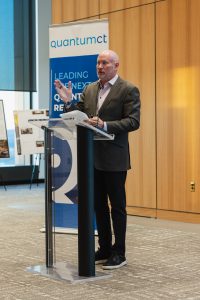UConn, Yale, and state officials are investing heavily in establishing Connecticut's prowess as a leader in quantum technology

UConn President Radenka Maric shares a laugh with Yale President Maurie McInnis and Connecticut Gov. Ned Lamont during a quantum infrastructure event held at Yale on Nov. 20. Photo contributed by QuantumCT.
UConn, Yale, and state leaders believe that Connecticut is perfectly situated to emerge as a national powerhouse in quantum technology and industry implementation. That confidence comes with a heavy investment and potentially game-changing dividends.
On Nov. 20, Gov. Ned Lamont announced that the state has pledged a total of $121 million to QuantumCT, a non-profit working to advance the state as a quantum technology accelerator. UConn and Yale co-lead the proposal that led to the organization's formation, working with governmental, industrial, and other leaders.
QuantumCT is on the cusp of a transformative grant from the National Science Foundation (NSF) Regional Innovations Engines program. The proposal is a finalist for up to $160 million in funding, with a critical site visit set for next week and a decision anticipated in early 2026.
The potential grant would be a crowning achievement for partnerships that are moving the state forward. But, as UConn President Maric asked during the event, "Why Connecticut?" The answer is multifaceted, with roots in groundbreaking technology, advantageous geography, and a well-educated populace.
"Connecticut has always been the most innovative state in the country," Lamont said. "This goes back hundreds of years. This is just in our DNA. This is why we are who we are. This is why we we're leading the next quantum revolution."
UConn and Yale represent two critical Connecticut sectors: advanced engineering and biotech, where quantum is already evolving the industry. Quantum technology is anticipated as a $200 billion industry by 2040.

The state's job market is projected as quantum and AI-heavy as the technologies integrate with existing industry. With the universities educating the workforce with the tools to meet demand, the opportunity is there for the taking.
"The time to prepare our state, to lay the groundwork for our future, and to prepare our workforce is now, and I believe Connecticut is uniquely positioned to lead," said Daniel O'Keefe, Connecticut's Commission of Economic Development. He called it a "Silicon Valley-like moment" as quantum emerges as key to development across many industries. "For over a century, Connecticut has led in advanced manufacturing and in the application of advanced technology. This is what Connecticut does, so today, we once again announce our intention to lead."
Maric cited industries such as national security, bioscience, and pharmaceuticals all located in Connecticut. She said that as result of collaborations between companies and QuantumCT, there are already 21 quantum-related projects underway.
"There is no good science if it doesn't yield good technology, There is no good technology if it doesn't make a product, and there is no product if it doesn't have a market to sell and bring money back," Maric said.
Connecticut's major employers, leading research universities, and training institutions are all within 80 miles of New Haven, which has been tapped as Connecticut's quantum epicenter.
"A lot of people would say something like the governor is betting on New Haven's future in quantum," said New Haven Mayor Justin Elicker. "I'm not a gambling man. I would say to the governor, you are securing New Haven's future as the center of quantum innovation and development, not just in our state but our nation."
Historical Precedent
Yale President Maurie D. McInnis observed that this year marks the 100th anniversary of the establishment of quantum physics, a field that has included breakthroughs from the likes of Albert Einstein, Erwin Schrodinger, and Werner Heiseberg. Recent discoveries have involved Connecticut-based research. In fact, 2025 Nobel Prize in Physics laureate Michel Devoret won his award for quantum research that he undertook while on the Yale faculty in 1985.
"Today, our researchers continue this work to start another quantum revolution for the next century of innovation," McInnis said. "Crucially, we are so excited to be in partnership with UConn and other schools throughout the state, the private sector, local leaders, community partners, and the state of Connecticut, all brought together in QuantumCT. It's a really historic collaboration that illustrates what universities do well: working together to help strengthen communities, make each other more productive, and build the workforce of the future."

UConn's interim Provost Pamir Alpay led the QuantumCT proposal to the NSF, working closely with Michael Crair, Yale's Vice Provost for Research. They recognized Connecticut's potential as a quantum accelerator and collaborated with other higher education institutions throughout the state, as well governmental and industrial partners.
"Three years later, that shared vision has become a reality. We have built an alliance of quantum technology between our universities," said Alpay. "Our faculty and students are working together and are deeply engaged with our industrial partners, many of whom are here today, representing the sectors that make Connecticut the envy of the nation."
UConn's Quantum Alliance features 90 researchers all working on quantum-related projects. The University has also invested millions in facilities like the Science 1 Building and the Innovations Partnership Building where much of the quantum research takes place and is put to practice.
The $121 million investment includes $61 million already announced and invested. The state will contribute $60 million more upon the potential awarding of the NSF grant.
"Radenka asked 'Why Connecticut? I think it's obvious, I think it's 'Of course Connecticut.' This is what we do in Connecticut," Lamont said.






